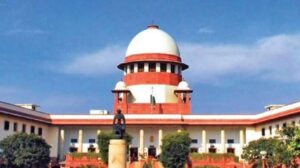
The Supreme Court today refused to grant legal recognition for queer marriages in India. However, all the judges on the bench agreed to direct the Union of India to constitute a committee to examine the rights and entitlements of persons in queer union, without legal recognition of their relationship as a “marriage”.
A five-judge bench, led by Chief Justice of India DY Chandrachud and comprising Justices Sanjay Kishan Kaul, S Ravindra Bhat, Hima Kohli, and PS Narasimha, had started hearing the petitions on April 18, 2023. After rigorous deliberation, the bench reserved its judgment on May 11, 2023. Today, the Supreme Court Constitution bench pronounced four judgements– written by CJI DY Chandrachud, Justice SK Kaul, Justice Ravindra Bhat and Justice PS Narasimha respectively.
There was a degree of disagreement among the judges on certain aspects.
CJI DY Chandrachud, in his judgement held that the court could not strike down or read down the provisions of the Special Marriage Act owing to “institutional limitations” as the same would fall within the domain of the Parliament and the Legislature. However, the CJI recorded the statement of the Solicitor General, appearing for the Union, that the Union Government would constitute a committee to decide the rights and entitlements of persons in queer unions. In his judgement, the CJI also held that transgender persons in heterosexual relationships had the right to marry under the existing laws including personal laws. Further, he held that unmarried couples, including queer couples, could jointly adopt a child. In that context, the CJI held that Regulation 5(3) of the CARA Regulations, insofar as it prohibited unmarried and queer couples from adopting, were in violation of Article 15 of the Constitution. Justice SK Kaul concurred with the judgement of the CJI and while stating that queer unions “are to be recognized as a union to give partnership and love”, held that the Special Marriage Act was violative of Article 14 for being discriminatory. However, similar to the view taken by the CJI, Justice Kaul too held that there were limitations on the court in including queer unions in the Special Marriage Act as the same was for the Parliament to decide.
Justice S Ravindra Bhat opposed the judgement of the CJI and stated that an entitlement of legal union of marriage could only be through enacted law. However, consistent with the statement made to the Court by the Solicitor General, Justice Bhat too concluded that the Union shall set up a High Powered Committee to examine the rights and benefits to queer couples. He stated that the present case was not one where the Supreme Court could require the State to create a legal status. Differentiating the present case from previous cases pertaining to queer rights, he stated that earlier, the Court’s intervention was in instances where the Court protected queer persons from violence or criminalisation based on State’s duty to protect citizen’s right. However, the present matter was not the same. He asserted that marriage was a “social institution” and there could not be an unqualified right to marry which was to be treated as a fundamental right. “If it is agreed that marriage is a social institution, does it follow that any section of society which wishes for the creation of a like institution, can seek relief by court intervention?,” he stated.

